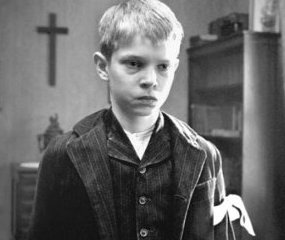 Shot like a miraculously preserved old photograph, told like a great novel by its elderly narrator some 40 years later, The White Ribbon
Shot like a miraculously preserved old photograph, told like a great novel by its elderly narrator some 40 years later, The White Ribbonis subtitled “A German Children’s Story.” But this dark fable is really Michael Haneke’s A Series Of Unfortunate Events.
An invisible tripwire lashed between two trees sends a doctor crashing off his horse – and that mysterious ‘accident’ is just the start of the strange and increasingly terrible crimes in a quiet German village on the brink of World War One. Pets are killed, cabbages are beheaded, women are humiliated. But again and again, it’s the kids who get it bad.
A pastor binds his eldest son’s hands to allay his fears of the boy’s activities during the night. A widowed doctor guiltily molests his 14-year-old daughter. A mentally disabled child is found beaten to a pulp in the woods. Funny games, indeed. What history of violence are these victimised blond cherubs destined to pass on in the decades to come? It’s 1914. You do the maths. No wonder Haneke shoots them like extras from Village Of The Damned.
No wonder audiences went to see 2012instead. Severity like this is easy to admire and hard to love, so it’s some mercy that The White Ribbon never casts the shadow of fascism too thickly. Violence in the Austrian filmmaker’s movies usually assaults us from off-screen, but his real surprise attacks here are the oh-so-tender scenes of shy romance and cheeky humour, shuttled in via the lovely sub-story of a geeky schoolteacher tentatively courting a young nanny. Carefully unwinding his movie over 144 minutes, Haneke pulls a masterful coup in keeping the drama patient but the tension tight. Something always feels just around the corner. Something bad. Enigmatic, forceful, expertly crafted, superbly acted and rich enough to be a mini-series (the original plan, in fact), The White Ribbon is also Haneke’s most beautiful movie. Hidden
and The Piano Teacher
lenser Christian Berger shot the movie in colour, then drained it away and digitally sharpened the image, leaving behind stunning monochrome cinematography that picks out facial expressions with alarming immediacy.
So it’s hard to fault this superior movie from Europe’s most revered modern filmmaker. Then again, superior is the word. The only thing that makes The White Ribbon gleam a little coldly is the fact that, not unlike another recent “masterpiece” There Will Be Blood, you can’t shake the feeling that’s exactly what its maker thinks it is.
No commentary, no interview, no nothing on the DVD. The wait for a Haneke blooper-reel continues.
FILM: [rating stars = “5”]
EXTRAS: [rating stars = “1”]










